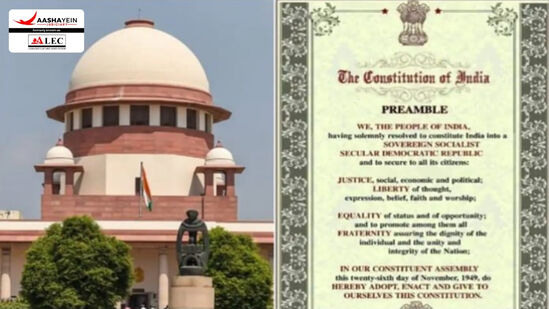On Monday, the Supreme Court rejected the petitions challenging the 1976 amendment to the Constitution, which added the words “socialist,” “secular,” and “integrity” to the Preamble. A bench led by Chief Justice Sanjiv Khanna and Justice Sanjay Kumar had reserved its judgment on November 22 regarding a group of petitions filed by former Rajya Sabha MP Subramanian Swamy, advocate Vishnu Shankar Jain, and others, questioning the inclusion of the terms “socialist” and “secular” in the Preamble.
Background of the case
In July 2020, Dr. Balram Singh, a Supreme Court lawyer, filed a petition questioning the inclusion of the words "socialist" and "secular" in the Preamble of the Constitution. Following this, former Law Minister Subramaniam Swamy and advocate Ashwini Kumar Upadhyay also filed similar petitions.
They challenged the inclusion of "socialist" and "secular" in the Preamble on various grounds which are-
- It was argued that the retrospectivity of the 1976 amendment was invalid, as the Constitution was adopted on 26-11-1949, and the word ‘secular’ was purposely left out by the Constituent Assembly.
- The inclusion of the word ‘socialist’ in the amendment was claimed to limit the economic policy choices of the elected government, which should reflect the will of the people.
- It was further argued that the 42nd Amendment was unconstitutional because it was passed during the Emergency on 2-11-1976, after the Lok Sabha's normal tenure ended on 18-3-1976, meaning there was no valid mandate from the people for these amendments.
You can also read the latest judgment by visiting [Latest Judgment].
For more information, visit [Aashayein Enquiry Section]
Inclusion of the words socialist”, “secular”, and “Integrity” in the Preamble
The preamble of the Constitution outlines the core principles and objectives of the Indian Constitution. When the Constitution came into effect on January 26, 1950, it did not include the words “Socialist,” “Secular,” and “Integrity.” During the Emergency, when the Indira Gandhi government was restricting civil liberties and imprisoning political opponents, Parliament passed the 42nd Amendment. This amendment, often called a “mini-constitution” due to the numerous changes it introduced, significantly increased the powers of the central government.
The Preamble was also revised, adding the words "Socialist," "Secular," and "Integrity," transforming it to read “Sovereign, Socialist, Secular, Democratic, Republic.” This change was intended to clearly express the ideals of socialism, secularism, and national integrity in the Preamble.
Court’s interpretation
The Court clarified that the current petitions did not need a detailed examination because the weaknesses in the arguments were evident. It noted that the terms ‘secular,’ ‘socialist,’ and ‘integrity’ were added to the Preamble through the Constitution (Forty-second Amendment) Act, 1976. According to Article 368 of the Constitution, the Constitution can be amended, and this power lies with Parliament, extending even to the Preamble. Amendments can be challenged on various grounds, such as if they violate the Constitution's basic structure. The Court stated, “The fact that the Constitution was adopted, enacted, and given to themselves by the people of India on the 26th day of November 1949, does not make any difference. The date of adoption will not curtail or restrict the power under Article 368 of the Constitution.”
The Court also dismissed the argument about retrospectivity, stating that Parliament's power to amend extends to the Preamble as well, and the date the Preamble was adopted does not limit this power. In this regard, the bench referred to the majority judgment in the 9-Judge Constitution Bench decision in "Property Owners Association and Others v. State of Maharashtra and Others". The verdict clarified that the Constitution, framed in broad terms, allows the elected government to adopt an economic governance structure that aligns with the policies it is accountable to the electorate.
The Apex Court concluded the case with the statement of the Chief Justice of India which states that-
“the fact that the writ petitions were filed in 2020, forty-four years after the words ‘socialist’ and ‘secular’ became integral to the Preamble, makes the prayers particularly questionable. These terms have achieved widespread acceptance, with their meanings understood by ‘We, the people of India’. The additions have not restricted or impeded legislation or policies pursued by elected governments, provided such actions did not infringe upon fundamental and constitutional rights or the basic structure of the Constitution”
conclusion
The judgement has its importance as it stands as a bulwark against inequality in the present times. The horrifying data says that India is among the most unequal countries in the world, with the top 10% and top 1% of the population holding 57% and 22% of the total national income respectively. Since 1991, India’s economy has shifted from a socialistic framework to a market-oriented model, resulting in significant growth that has lifted many people out of extreme poverty. However, this growth has also led to rising inequality, which remains a critical issue. As the court noted, India’s socialist principles continue to support the disadvantaged through initiatives like MGNREGA, subsidized food grains, and direct benefit transfers to women and farmers. This underscores the importance of maintaining a balance between socialism and market-driven growth, ensuring that while private enterprise thrives, the welfare of the marginalized is not overlooked. As inequality continues to widen, the question arises: Does India need to reassess and strengthen its socialist stance to ensure more equitable growth and social justice?

